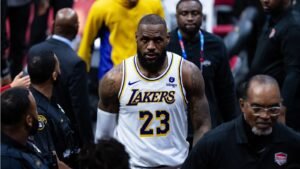Is FIFA Still Corrupt?

Before we can consider whether FIFA is still corrupt, we must first cast our minds back to the overwhelming proof that they at least once were.
On Dec. 2, 2010, then-President of FIFA Sepp Blatter controversially announced that Russia had been selected ahead of England to host the 2018 World Cup. On the surface, although disappointing for fans of the Three Lions, the decision at least seemed plausible. Russia had competed in numerous World Cups, after all. However, FIFA revealed the news alongside a stranger announcement – Qatar would hold the 2022 World Cup.
With a population of just 2.6 million, no history of competing in the World Cup, and no stadiums to even host the games, it is fair to say that the choice of Qatar raised eyebrows.
In 2010, the FBI was working on an investigation into Russian organized crime, while the IRS started looking into a FIFA executive committee member (Chuck Blazer) just one year later, according to Ethics Unwrapped. When the two investigations joined forces, they uncovered a trail that led all the way to potential corruption in the World Cup bidding process. After a thorough probe across 33 countries, the FBI and IRS found a myriad of bribes and kickbacks linked to FIFA officials, over $150 million to be exact. Blazer even claimed the South African government paid a $10 million bribe to host the 2010 World Cup too. It turned out the bribery went all the way back to the 1990s.
In 2015, the U.S. Department of Justice indicted 14 FIFA officials and marketing executives, with 16 more charged for their involvement as the investigation continued. Russia and Qatar pled their innocence and were allowed to host the 2018 and 2022 World Cups, but FIFA itself introduced 2015 reforms, including a more thorough bidding process for future competitions, according to coverage by The Guardian.
The corruption ran deeper than the bidding process alone, though, as the investigation found evidence of bribes related to broadcasting rights, sponsorships, and merchandise, too. As recently as 2023, Century Fox Executive Hernan Lopez and Argentine sports marketing company Full Play Group S.A were convicted for participating in schemes to bribe FIFA for the media and broadcasting rights to football tournaments, according to a press release by the U.S. Attorney’s Office.
Somehow, Sepp Blatter won the next election to remain FIFA President in 2015, but swiftly announced he would resign once a new candidate was voted in. FIFA drafted a 12-page document full of reforms and changes to usher in a new era of FIFA, with more emphasis on accountability and transparency. An administrator at European soccer’s governing body, Gianni Infantino, was included among the authors of this report. In 2016, he became FIFA’s new President.
And so began a new age of FIFA…
Unfortunately, fast forward eight years, and many fans of the game are skeptical over whether those reforms were actually introduced with any intent or whether they were merely a PR exercise designed to hush the masses.
In 2024, Infantino moved to reintroduce a series of committees that were used before the 2015 scandals, according to Fortune. Why are these committees significant? It involves Infantino handing out hundreds of expense-paid jobs to officials all around the world – officials who are then able to vote in the FIFA presidential elections every four years. So, you can see why rolling back on a reform that grants such a clear opportunity for the President to scratch some backs and ask for some scratches in return may have raised eyebrows. After all, that was how Sepp Blatter built his 17-year FIFA dictatorship. There is no proof to say that is what Infantino will or would do, but it creates doubt and creates the opportunity for some nefarious goings-on.
Fortune also reported that the Asian Football Confederation, which is made up of 47 members, also moved to abolish term limits for senior elected officials, thus allowing President Sheikh Salman of Bahrain to remain in charge beyond his current 14 years. This seems like another slippery slope for international football, with the idea of Sepp Blatter rearing its ugly head once more. Infantino and the Presidents of football’s six continents all came to power around 2013 when their predecessors were ousted. But should such senior officials be allowed to hold their positions for so long? After all, even the President of the United States isn’t allowed to stay longer than two terms.
The reform panel’s original job was to restore trust and faith from fans and commercial partners alike. But can we really say that has been achieved? The 12-page advisory document suggested that Presidents should only be in their post for a maximum of 12 years. Gianni Infantino is set to stay in office for at least 15 years until 2031. The document also suggested that only nine standing committees should be used in order to improve efficiency – FIFA is now preparing to introduce a total of 35, plus additional ad-hoc task forces. It seems clearer and clearer that the FIFA reforms were nothing more than a distraction rather than a legitimate attempt to change things for the better.
Despite this, the idea of corruption in FIFA is still at the forefront of people’s minds. In fact, as recently as 2023, a former 21st Century Fox executive and an Argentina-based sports marketing company called Full Play Group were convicted of bribing officials in a long-running FIFA case, according to prosecutors. The bribery in question may have taken place during FIFA’s corruption era, but the continuation of the story does little for the governing body’s new squeaky-clean image.
And who better to analyze the current state of FIFA than a former official at CONCACAF, FIFA’s governing body for football organizations in North and Central America and the Caribbean? Mel Brennan worked with investigative journalist Andrew Jennings more than 10 years ago to expose corruption within CONCACAF. It’s safe to say they were right, too, as CONCACAF General Secretary, Chuck Blazer, later confessed that he took World Cup-related bribes. He even added that a number of other FIFA executive committee members did the same.
“Wherever you can’t see inside ostensibly not-for-profit organizations like FIFA, that’s where all the lying, cheating and stealing is taking place,” Brennan said to the CBC in an interview.
“FIFA has become more polished. As to whether there’s been actual change, I think they’ve just become slicker.”
Therein lies the problem for FIFA. It’s almost irrelevant as to whether they have eradicated corruption. The problem is, from the outside, it seems like they aren’t that bothered about it. And if they aren’t doing much to change the environment in which corruption festered, then the chances are it’s not gone for good.
In 2022, YouGov ran a survey among the general population and football fans to see whether people still thought FIFA was corrupt, almost a decade after the scandal. Ninety percent of football fans in Britain said they thought there was still probably corruption in the running of FIFA; 88 percent from Spain, 83 percent from France, 84 percent from Germany and 76 percent from Italy said the same thing. Even among the general population, at least three-quarters of people surveyed from Spain, Britain, France and Germany said there was probably still corruption in FIFA, showing how this opinion transcends even the world of football.
The court of public opinion appears to have spoken. Corruption was rife back in 2015, and, for many years, we had no idea about it. In order to win back the trust of the people, you have to take clear, transparent, and significant steps towards making a positive change. Maybe you could argue FIFA took the right first step by cleaning house and introducing the reforms, but since then, they have shown a complete disregard for actually following them. The world of football involves so much money, especially at the very top of the game, and people who hold senior positions within FIFA have near-limitless power over how the game is run. So, why would people trust them?
The sad truth is that there is almost definitely corruption still going on behind the scenes at FIFA. I would be confident to put it at 99.9 percent. They haven’t done enough to get rid of it, and when you give a high number of people a high level of power, someone is always going to extort it for their own gain. I have no idea how to fix it. There would have to be a willingness from those in power to do so, and those could be the very people profiting from corruption in the first place.
Discover More Muck
‘Crypto Godfather’ Pleads Guilty to Tax Crimes, Violating Civil Rights Via Off-Duty Cops
Report Matthew Koelher | Feb 24, 2025

Multiple People Plead Guilty in Scam to Rig Bids of Commercial Roofing Projects
Report Nik Mebane | Feb 14, 2025

Toyota Subsidiary Pleads Guilty and Will Pay $1.6 Billion for Clean Air Act Violations
Report Jessika Saunders | Feb 14, 2025

Weekly Muck
Join the mission and subscribe to our newsletter. In exchange, we promise to fight for justice.
Weekly
Muck
Join the mission and subscribe to our newsletter. In exchange, we promise to fight for justice.



